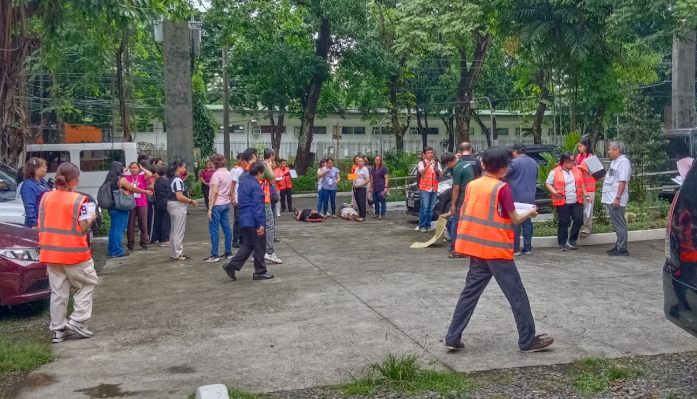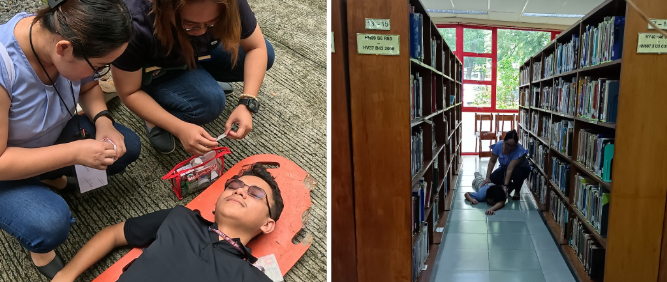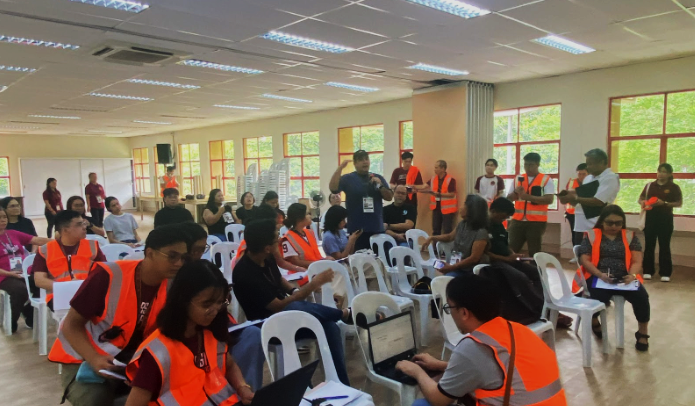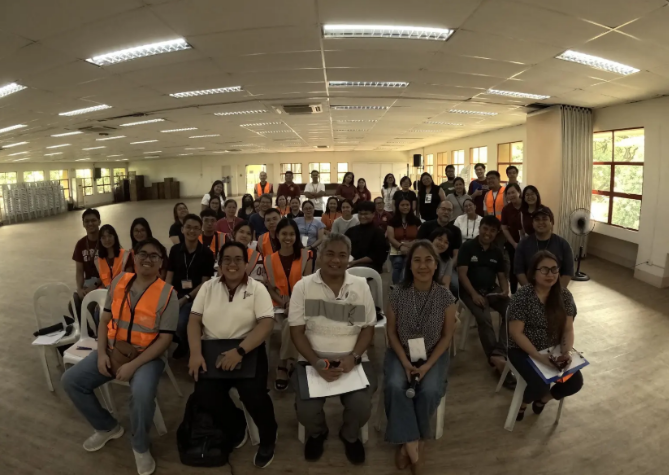
Image 1: UP CSWCD simulates their after earthquake protocols outside of the building.
Last June 19, 2025, The 2nd Quarter Nationwide Simultaneous Earthquake Drill (NSED) was held in various sectors and institutions in the country, including UP Diliman. For this quarter, the UP Resilience Institute (UPRI) teams up once more with UP College of Social Work and Community Development (UP CSWCD) to evaluate the College’s ongoing Emergency Preparedness Plan (EPP).

Images 2 and 3: (from L to R) Two actors simulate a head bump injury and a spinal injury.
The drill started at 9:00 AM when the bell (batingaw) was sounded in the building. While the CSWCD Incident Management Team (IMT) simulated their emergency response, staff and interns from UPRI served as the evaluation team for the actions and safety protocols of CSWCD before, during, and after the earthquake. The evaluation team also recorded the evacuee head count if CWSCD got all of the building occupants outside and conducted a building inspection to make sure that no one got left behind. Besides evaluating their execution and recording the head count, UPRI also examined the college’s incident command system (ICS), which was the chain of command and coordination team specifically for emergency and disaster responses. This meant that the Institute zoned in on their coordination on how to respond during critical situations. Some of these cases included the use of actors simulating injuries and students who attempted to enter the building despite the building’s uncertain safety. The drill ended at 9:24 AM when CWSCD’s incident commander (IC), Edgie Francis Uyanguren, declared the building safe and stood down. Afterwards, UPRI and CSWCD convened at the College’s Bulwagang Tandang Sora (BTS) for a quick debriefing session, spearheaded by UPRI.

Image 4: Mr. Edgie Francis Uyanguren, the Incident Commander of UP CSWCD, relays one of the improvements in this quarter’s NSED run for the college.
The debriefing started with an introduction from UPRI’s Institution Building (IB) Division led by Director Dr. Carlos Primero Gundran, prefacing the session with the purpose of the activity. “Gusto nating malaman kung anong pwedeng i-improve para mas ma-aksyunan ang ating galaw, ang ating response (We’d like to determine what else we can improve for a more efficient emergency response),” the IB Director explains. Dr. Gundran initiated the conversation by opening the floor to the response team first. Incident Commander Uyanguren went first with his discussion points. Uyanguren mentioned that the activity was prepared with CSWCD’s Safety and Security Department, which had briefing sessions and training prior to the activity. He also highlighted that one of their improvements is the addition of two room inspectors (called sweepers) per floor. Dr. Justin Francis Leon Nicolas, a member of the IMT’s planning section, also gave feedback on improving the work process of the team for members on standby.
After these discussion points, Dr. Gundran and the rest of the UPRI evaluation team went ahead with a brief yet comprehensive feedback session. Gundran started the evaluation points, stating a minute-specific timeline that covered the events in the 25-minute activity, along with his observations. This section of the evaluation highlighted how time is of the essence and how discrepancy in minutes would matter much during disaster response situations.
After Dr. Gundran’s points, the other members of the UPRI evaluation team took turns to state their quick feedback. This covered the evaluations per committee inside the IMT, the IMT’s material and human resource allocations during the activity, their response for each floor of the building, and their response to situations through the use of actors. The evaluation team also gave their appropriate commendations to the active participation of the college and the staff who performed well during the activity.
The debriefing session ended with closing remarks from the dean of the College, Prof. Lenore P. dela Cruz. Despite their initial hesitance, she attested that the hands-on evaluation from UPRI was very helpful to the college in improving their Emergency Preparedness Plan. “Yung aming Emergency Preparedness Plan is still a work in progress… pero na-realize naming lahat sa araw na ito na marami pang dapat paunlarin (Our Emergency Preparedness Plan is still a work in progress… but today, we all realized that there is still so much we need to develop).” Dean dela Cruz also reminded everyone to keep on developing the college’s plans, systems, and behavior towards disaster readiness and response, emphasizing that this is about “really developing a culture of safety and preparedness.” The debriefing session was adjourned at 10:08 AM, with a photo-op of all the participants in the activity.

Image 5: A picture of all the CWSCD NSED participants and the UPRI evaluation team.
This NSED evaluation and debriefing session served as a culmination of the year-long effort both institutions have put forth following a string of planning activities from Rapid Assessment, an Emergency Preparedness Workshop, and the recent tabletop exercise conducted last May 23, 2025.
Prepared by:
Aelx Andrea Dela Cruz
IB Student Intern
